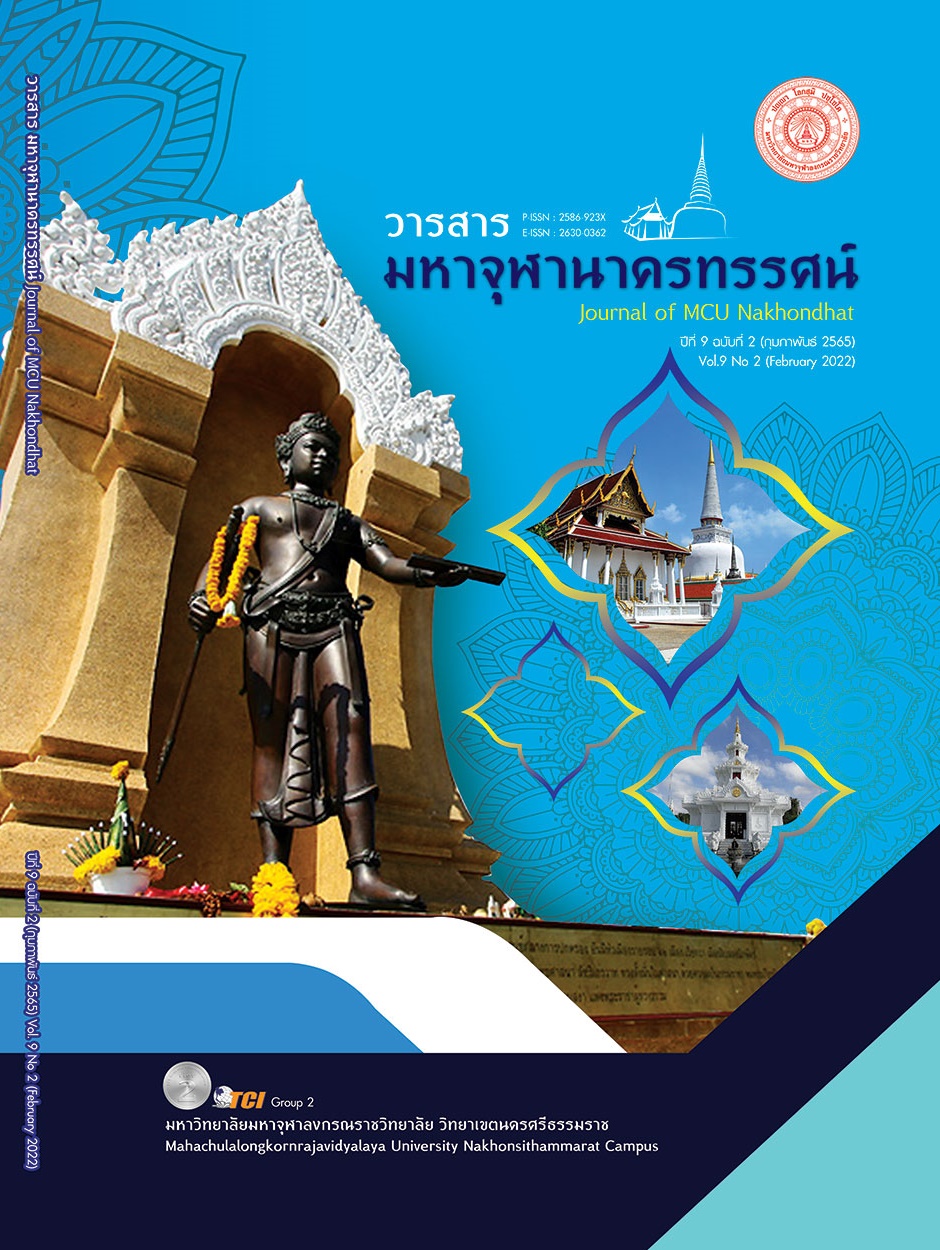MONKS’ RIGHTS UNDER CRIMINAL LAW
Main Article Content
Abstract
Monks are a group of people in the country but the Criminal Procedure Code of Thailand doesn't clearly state the rights of monks enough that monks have special privileges. And there is no provision under Thai law that gives specific and systematic rights to monks in any way. It appears only in some criminal proceedings. It is a criterion for treating monks who are charged with criminal charges. By taking into account the impact on the rights and freedom of monks such as arrest, investigation, prosecution, trial and adjudication and the enforcement of penalties in practice has several problems. Western society has set up "religious courts" with wide powers to solve problems of people and monks. Especially the issue of belief and morality and has the power to consider all cases of crimes against religion. Offenses that violate religious principles, offenses of gross antagonism and offenses of immorality. Civilized societies hold that rights and freedoms are necessary for each human being. Human beings exercise their rights and freedoms to develop their personality both physically and mentally as their highest values. State organization, whether it is an organization that uses legislative power. The executive or judicial body shall respect constitutional freedoms as the supreme law. A monk who breaks a criminal law must act according to the law that the country has stipulated, but the monk must also be under the Sangha Act, which is a law that is provided for dealing with monks who commit criminal offenses as well. Offenses related to religion, rules, ordinances are to control the behavior of individuals in society to follow in the same direction.
Article Details

This work is licensed under a Creative Commons Attribution-NonCommercial-NoDerivatives 4.0 International License.
References
เกียรติขจร วัจนะสวัสดี. (2549). คำอธิบายกฎหมายอาญาภาค 1. (พิมพ์ครั้งที่ 9). กรุงเทพมหานคร: จรรัชการพิมพ์.
แสวง อุดมศรี. (2530). การปกครองคณะสงฆ์ไทย. กรุงเทพมหานคร: โรงพิมพ์แห่งจุฬาลงกรณ์มหาวิทยาลัย.
กิตติวัฒน์ รัตนดิลก ณ ภูเก็ต. (2552). คู่มือศึกษาพื้นฐานวิชากฎหมายรัฐธรรมนูญ. (พิมพ์ครั้งที่ 2). กรุงเทพมหานคร: เสมาธรรม.
บุญศรี มีวงศ์อุโฆษ. (2553). กฎหมายรัฐธรรมนูญ. (พิมพ์ครั้งที่ 4). กรุงเทพมหานคร: โรงพิมพ์มหาวทยาลัยธรรมศาสตร์.
ประทีป ทับอัตตานนท์. (2548). กฎหมายอาญา ภาค 1 การใช้กฎหมายและความรับผิดทางอาญา. กรุงเทพมหานคร: พลสยามพริ้นติ้ง แอนด์ พับลิชชิ่ง.
ปริศนา สมศักดิโยธิน. (2544). ความผิดเกี่ยวกับศาสนาตามประมวลกฎหมายอาญา: ศึกษากรณีการกระทำความผิดต่อพระพุทธศาสนา. ใน วิทยานิพนธ์นิติศาสตรมหาบัณฑิต สาขาวิชานิติศาสตร์. จุฬาลงกรณ์มหาวิทยาลัย.
พระพรหมคุณากรณ์ (ป.อ. ปยุตฺโต). (2555). นิติศาสตร์แนวพุทธ. (พิมพ์ครั้งที่ 13). กรุงเทพมหานคร: วิญญูชน.
รุจิระ บุนนาค. (22 มิถุนายน 2561). คดีอาญากับการสละสมณเพศ. หนังสือพิมพ์แนวหน้า, หน้า 14.
วิกิพีเดีย สารานุกรมเสรี. (2564). การจับ. เรียกใช้เมื่อ 19 ธันวาคม 2564 จาก https://th.wikipedia.org/wiki/
สมเด็จพระมหาสมณเจ้า กรมพระยาวขิรญาณวโรรส. (2500). หนังลือเรียนนักธรรมชั้นตรี วิชาวินัยมุข. กรุงเทพมหานคร: โรงพิมพ์มหามกุฎราชวิทยาลัย.
สมชาย บุญคงมาก และภูภณัช รัตนชัย. (2561). ปัญหาการสละสมณเพศของพระภิกษุตามพระราชบัญญัติคณะสงฆ์ พ.ศ. 2505: ศึกษากรณีการใช้อำนาจดุลยพินิจของเจ้าหน้าที่ของรัฐในกระบวนการยุติธรรม. วารสารมนุษยศาสตร์และสังคมศาสตร์ นายเรืออากาศ, 6(2561), 11-24.
สัมพันธ์ เสริมชีพ. (2543). คู่มือพระสงฆ์ไทย เจ้าอาวาสเป็นเจ้าพนักงานหรือไม่? กรุงเทพมหานคร: ส. เสริมมิตร.
สุนทร ณ รังษี. (2539). “การปกครองคณะสงฆ์: อดีต ปัจจุบัน อนาคต”. วารสารพุทธศาสน์ศึกษา, 3(3), 5-21.
อภิรัตน์ เพ็ชรศีริ. (2552). ทฤษฎีอาญา. (พิมพ์ครั้งที่ 2). กรุงเทพมหานคร: วิญญูชน.


